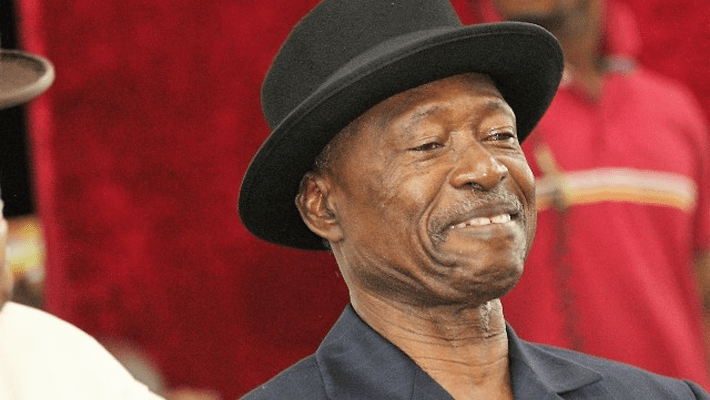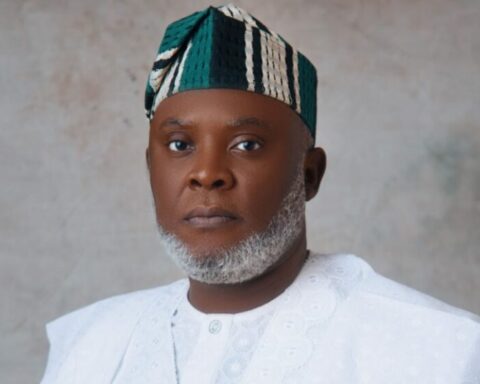By Azu Ishiekwene
I encountered the relic of his presence long before I met Sam Amuka, known as Uncle Sam. Inside a room in the far corner of the old Kudeti PUNCH building, predominantly constructed of plywood and steel frames, there was a wooden armchair that had been a fixture in Uncle Sam’s office when he served as managing editor.
When I joined PUNCH as a staff writer eight years after his departure in 1981, this piece of furniture was in my first office, sitting like a totem in a shrine, while stories about Uncle Sam floated in whispers.
The stories could not be told freely in PUNCH at the time because of the bitter dispute between Uncle Sam and his friend and Publisher, Olu Aboderin, which would later end in an out-of-court settlement.
So, if one were looking for stories about Uncle Sam’s early professional life, particularly his works, the Daily Times would have been a good place to find them.
In the 1990s, however, the Times started having its own problems, leading to frequent changes at the top, and a dramatic sale that imperilled not only access to the records of the newspaper’s leading lights like Uncle Sam, but even the history of the newspaper which, in its heyday, was Nigeria’s most prosperous, authoritative and vibrant brand.
From ‘Offbeat Sam’ to ‘Sad Sam’
Uncle Sam made his name at the Daily Times, but his journalism career did not start there. According to Ben Lawrence, in an article entitled “An artiste and a builder,” published in Voices from Within, a collection of articles edited by Lanre Idowu to mark Uncle Sam’s 70th birthday, he made his first call at the Sunday Express, where John Pepper Clark was features editor.
J.P. Clark nurtured him, but it was at the Times that his talent blossomed. He started with “Offbeat Sam,” which, as the name suggested, was an unconventional, straight-from-the-heart weekly column that stripped many social and political issues of their cloak of hypocrisy.
Like many elites in the 90s who criticised gossip magazines as street rags but never missed reading them behind closed doors, “Offbeat Sam” made politicians and government officials uncomfortable. But it was a foretaste of what was to come.
When Uncle Sam moved from the Sunday Express to become editor of Spear magazine (he later edited the Sunday Times), a Daily Times publication set up to rival Drum of South Africa, he started the “Sad Sam” column. His entry expanded a vibrant and robust field of punditry that included the likes of Hadj Alade Odunewu, Peter Enahoro (Peter Pan), Clarkson Majomi, Gbolabo Ogunsanwo, Haroun Adamu, and Uche Chukwumerije, amongst others.
Writing for a living
“Sad Sam” was not interested in the news. He exploited the foibles and follies of politicians and those in authority to entertain, provoke emotions, or instigate deeper thinking about who we are.
An article by Gbemiga Ogunleye, “The columnist’s power,” quoting Sad Sam in the Sunday PUNCH of August 12, 1973, said, “I (Sad Sam) write for the same reason that a houseboy cleans the house or a secretary-typist takes shorthand and types or a taxi driver rides the street, touting for fares…or an executive in business or government goes to the office or a professional burglar steals. For a living, that’s all. It’s none of my business to correct the ills or save this country!”
I’m a bit like Sad Sam these days, chastened by the years and weary of making any fuss about changing the world by writing. However, one area in which I could never be like Uncle Sam is his management style.
Be ‘a little mad’
In an industry where he once admitted in a sticker on the wall of the PUNCH newsroom, “You don’t have to be mad to work here, but a little madness helps,” how did he manage a steely coolness in his small body frame amidst the turmoil of the newsroom, never mind the many tempests of a life forged in the vicissitudes of the streets of Oguanja in Sapele?
Was his stoicism partly shaped in his formative years, including his time as a left-winger for the Government College, Ughelli football team and his education at the Nigerian College of Arts, Science and Technology, Enugu, where he studied architecture?
As Odunewu wrote, the intensity of the newsroom creates more of the likes of Lord Beaverbrook, the publisher of the Daily Express or MKO Abiola of the Concord – or even Sam Nda-Isaiah of LEADERSHIP – a breathless and restless stock in whose corner I find myself, than the likes of Uncle Sam who would rather go to the office with a peace offering than drag the office to their presence by the scruff of the neck.
An eye for talent
Eric Teniola, who worked with Uncle Sam in PUNCH between 1977 and 1981, as Oyo State Editor, Constituent Assembly Editor and Lagos City Editor, told me that one of Uncle Sam’s greatest gifts is his capacity to always look on the bright side, the opposite of the essence of a Sad Sam.
“He knew how to spot a talent and to bring out the best in the people who worked with him,” Teniola said. “From Muyiwa Adetiba to Toye Akiode and Frank Aigbogun, he identified some of the most remarkable talents in the newsroom and created the environment that inspired them to work. He was always informal, unpretentious and spontaneous, looking for a reporter to give a big break or a miserable bloke to give a free lunch.”
Ademola Osinubi, former MD/Editor-in-Chief of PUNCH, who started as a reporter in 1976, and later became the chief reporter under Uncle Sam, said, “With Uncle Sam, you couldn’t be sure your script would pass the test until it’s been published. He was an editor’s editor.”
Gene vs. lifestyle
As for his longevity, that is a different story. It’s probably part hereditary. Uncle Sam’s mother died at 109. Apart from his older brother, Oritsedere, who passed in 2002, the other three from the same mother are still alive, and the youngest is a woman, Amanaghan, 76. Uncle Sam’s daughter, Omasan Dudu, told me he is a good swimmer and, until recently, maintained a personal yoga coach.
“He still goes to the office every Monday and takes his exercises seriously,” she said. “I remember he fought against the attempt to convert the open space in his community in Lagos, Anthony Village, where he exercised. But most of all, his longevity is down to his generosity of spirit and God’s grace. That’s how he has managed multiple ulcer surgeries and other big challenges in life. It’s grace.”
In my obsession to live a long, healthy life, only God knows how many things I have given up.
I can’t remember when I last used a sweetener or milk, even gluten-free ones, for my tea or pap. Last year, when I visited him, Uncle Sam had his tea with plenty of honey and topped his tea with several spoonsful of sachet Cowbell milk. Packets of Kemp’s crackers biscuits littered the cane table.
Daddy DJ!
To create the perfect ambience for his refreshment, he turned on music stored on a flash drive. “You don’t know I’m called Daddy DJ?” he joked in response to my puzzled look. That was new to me from a man I consider Nigeria’s answer to Jimmy Breslin.
In a tribute to Breslin after his death, The Guardian wrote that he was the champion of the trials and troubles of the ordinary people in New York. “He filled his columns with gangsters and thieves, whom he knew first-hand from drinking in the same bars. He told stories that smacked of blarney behind their anger.”
That could have been Sad Sam, a man punctual as the clock, passionate about press freedom and sustained by righteous rage.
Live and let live
Three years ago, he had a fracture. He had undergone a back surgery and was on his way to an appointment for an acupuncture procedure. Instead of walking over a plank in front of the place, he tried to jump over the gutter and fractured his leg. I asked the editor of Vanguard, Eze Anaba, how the Vanguard publisher, who was then 87 years old, had survived the fall.
“He believes that life has a NAFDAC number,” Anaba said. “Nothing can take you out if your number has not expired.”
I asked Osinubi how he would describe this man he has known for 49 years. “He lives life on his terms,” he said. “Live and let live.”
Here’s to another 20, Uncle Sam!
Azu Ishiekwene is Editor-in-Chief of LEADERSHIP and author of the book, Writing for Media and Monetising It.
Follow us on all social media platforms @dailyquery for news and analyses around the globe.



























